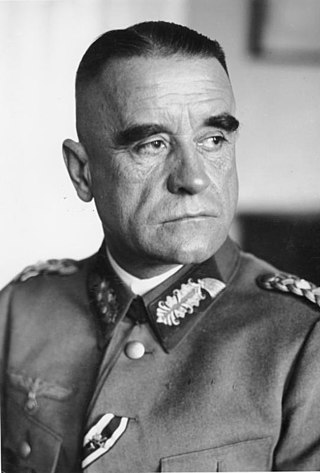
The Battle of Stalingrad was a major battle on the Eastern Front of World War II, beginning when Nazi Germany and its Axis allies attacked and became locked in a protracted struggle with the Soviet Union for control over the Soviet city of Stalingrad in southern Russia. The battle was characterized by fierce close-quarters combat and direct assaults on civilians in aerial raids; the battle epitomized urban warfare, being the single largest and costliest urban battle in military history. It was the bloodiest and fiercest battle of the entirety of World War II—and arguably in all of human history—as both sides suffered tremendous casualties amidst ferocious fighting in and around the city. The battle is commonly regarded as the turning point in the European theatre of World War II, as Germany's Oberkommando der Wehrmacht was forced to withdraw a considerable amount of military forces from other regions to replace losses on the Eastern Front. By the time the hostilities ended, the German 6th Army and 4th Panzer Army had been destroyed and Army Group B was routed. The Soviets' victory at Stalingrad shifted the Eastern Front's balance of power in their favour, while also boosting the morale of the Red Army.
Sven Hassel was the pen name of the Danish-born Børge Willy Redsted Pedersen known for his novels about German soldiers fighting in World War II. In Denmark he used the pen name Sven Hazel. He is one of the bestselling Danish authors, possibly second only to Hans Christian Andersen.

Friedrich Wilhelm Ernst Paulus was a German Generalfeldmarschall during World War II who is best known for his surrender of the German 6th Army during the Battle of Stalingrad. The battle ended in disaster for the Wehrmacht when Soviet forces encircled the Germans within the city, leading to the ultimate death or capture of most of the 265,000-strong 6th Army, their Axis allies, and collaborators.

The Third Battle of Kharkov was a series of battles on the Eastern Front of World War II, undertaken by Nazi Germany's Army Group South against the Soviet Red Army, around the city of Kharkov between 19 February and 15 March 1943. Known to the German side as the Donets Campaign, and in the Soviet Union as the Donbass and Kharkov operations, the German counterstrike led to the recapture of the cities of Kharkov and Belgorod.
Sturmtruppen is a successful Italian series of anti-war comic books written and drawn by Bonvi, the artistic pseudonym of Franco Bonvicini. It started as four-frame comic strips back in 1968 and evolved into fully sized collector books by the 1990s. The series continued until the early 2000s.

The 6th Army was a field army of the German Army during World War II. It is widely known for its defeat by and subsequent surrender to the Red Army at the Battle of Stalingrad on 2 February 1943. It committed war crimes at Babi Yar while under the command of Field Marshal Walther von Reichenau during Operation Barbarossa.
The 1st Panzer Army was a German tank army that was a large armoured formation of the Wehrmacht during World War II.

The 29th Infantry Division was a unit of the German army created in the fall of 1936. It was based on the old Reichswehr 15th Infantry Regiment and drew its initial recruits from Thuringia. It was upgraded to 29th Motorized Infantry Division in the fall of 1937. The division was also known as the Falke-Division.
XXXXVIII Panzer Corps, was a corps-level formation of the German Army which saw extensive action on both the Eastern and Western Fronts during World War II.
Sven is a Scandinavian masculine first name. In Old Norse the meaning was "young man" or "servant" and the original Old Norse spelling was sveinn.

The Hindenburg light or Hindenburglicht was a source of tallow lighting used in the trenches of the First World War, named after the Commander-in-Chief of the German army in World War I, Paul von Hindenburg. It was a flat bowl approximately 5–8 cm (2–3 in) in diameter and 1–1.5 cm (0.4–0.6 in) deep, resembling the cover of Mason jar lid (Schraubglasdeckel) and made from pasteboard. This flat bowl was filled with a wax-like fat (tallow). A short wick (Docht) in the center was lit and burned for some hours. A later model of the Hindenburglicht was a "tin can (Dosenlicht) lamp." Here, a wax-filled tin can have two wicks in a holder. If both wicks are lit, a common, broad flame results.

Strafbataillon is the generic term for penal units that were created from prisoners during the Second World War in all branches of the Wehrmacht. Soldiers, criminals and civilians sentenced to those units were generally poorly armed and required to undertake dangerous high-casualty missions. The Strafbataillon were operated and administered by the Feldgendarmerie, the German military police.

Legion of the Damned is the first in a series of fourteen World War II novels by Danish-born author Sven Hassel. The book covers a chronological period of a number of years, starting with the protagonist's arrest and time in German concentration camps, and ending with his being an officer and company commander on the Russian front. All of Sven Hassel's subsequent war stories, from a chronological point of view, fill in details omitted by this book.

The 14th Panzer Division was an armoured division in the German Army during World War II. It was created in 1940 by the conversion of the 4th Infantry Division.

The Belgorod–Kharkov strategic offensive operation, or simply Belgorod–Kharkov offensive operation, was a Soviet strategic summer offensive that aimed to liberate Belgorod and Kharkov, and destroy Nazi German forces of the 4th Panzer Army and Army Detachment Kempf. The operation was codenamed Operation General Rumyantsev, after the 18th-century Field Marshal Peter Rumyantsev and was conducted by the Voronezh and Steppe Fronts in the southern sector of the Kursk Bulge. The battle was referred to as the Fourth Battle of Kharkov by the Germans.

Walter Heitz was a German general (Generaloberst) in the Wehrmacht during World War II. He served as President of the Reich Military Court and commanded part of the 6th Army in the Battle of Stalingrad.
LI Army Corps was an infantry corps of the German Army during World War II that participated in the invasion of Yugoslavia. It was also present at the Battle of Stalingrad, where it was commanded by General Walther von Seydlitz-Kurzbach. After von Seydlitz-Kurzbach instructed his officers on 25 January 1943 that the question of surrender was their personal choice to make, he was relieved of command.

Franz Kurowski was a German author of fiction and non-fiction who specialised in World War II topics. He is best known for producing apologist, revisionist and semi-fictional works on the history of the war, including the popular English-language series Panzer Aces and Infantry Aces.

The 376th Infantry Division was an infantry division of the German Army during World War II, active from 1942 to 1944 in two separate instances.
The Misfit Brigade is a 1987 American television film loosely based on Sven Hassel's novel Wheels of Terror. The film was released in some markets under that title.












